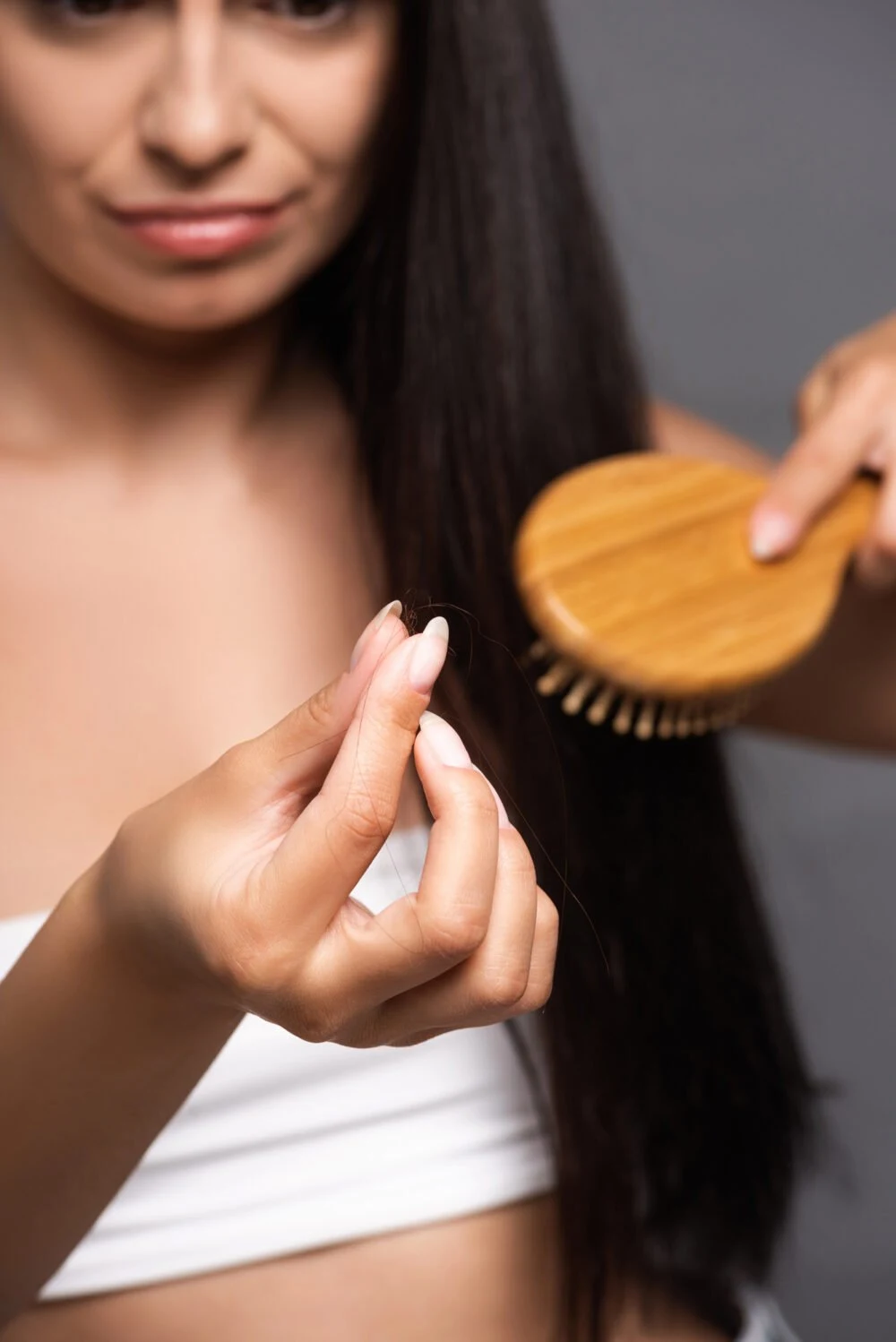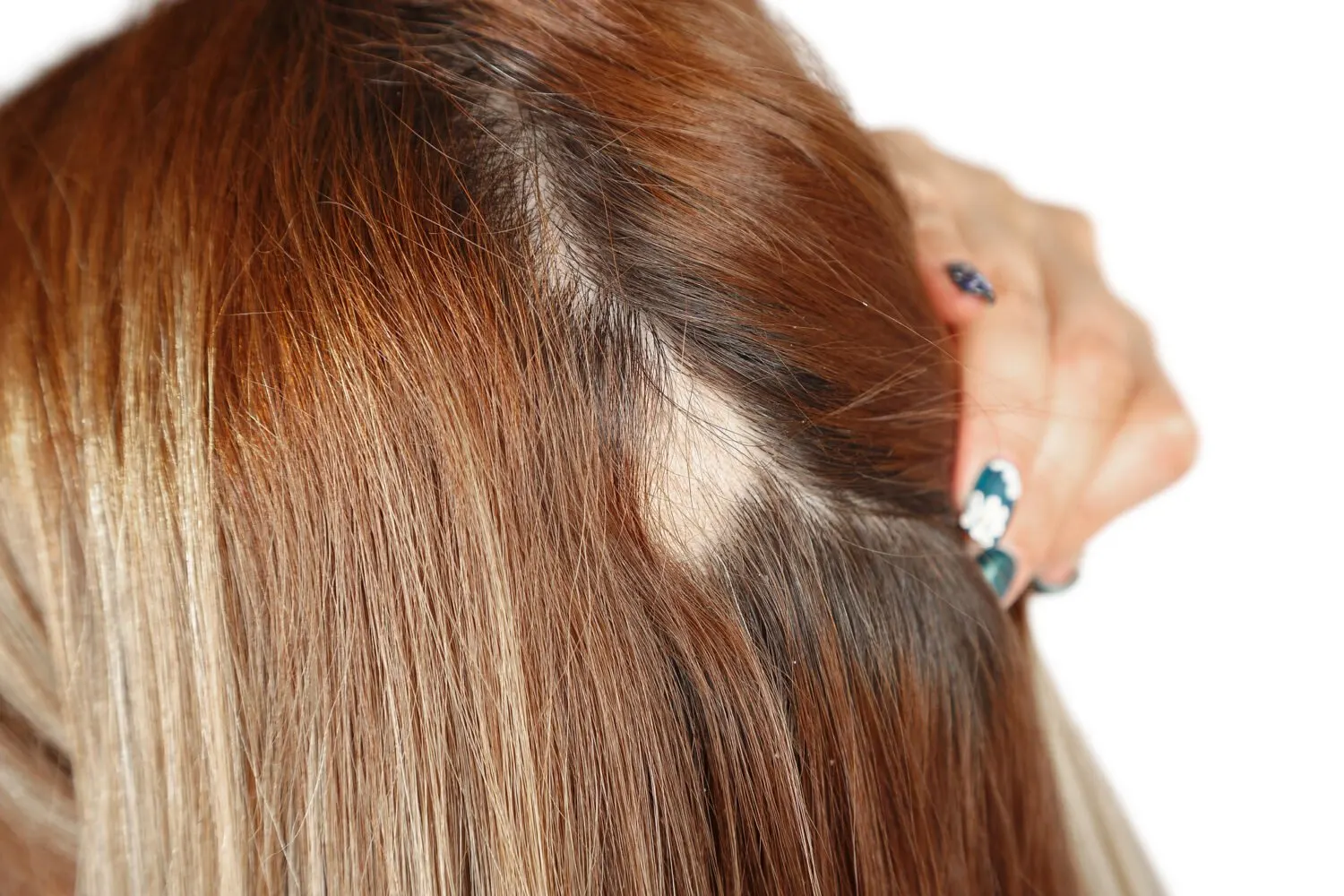Hair loss can be one of the most distressing experiences for women, affecting not just appearance but also confidence and emotional well-being.
While shedding 50-100 strands daily is normal, excessive hair loss signals an underlying issue that deserves attention.
Knowing what actually causes this hair loss is the first step toward finding effective solutions. Keep on reading to find out what could be causing your hair loss issues…

Hormonal Changes and Imbalances
Although many factors can contribute to hair loss in women, hormonal changes and imbalances also play a role.
We tend to notice increased hair shedding during certain life stages, such as puberty, pregnancy, postpartum, or menopause.
These times bring natural shifts in estrogen and progesterone levels, which impact your hair’s growth cycle. Whenever these hormones fluctuate or drop, our hair can enter a resting phase, which leads to thinning or shedding.
Other health conditions, like polycystic ovary syndrome (PCOS) or thyroid disorders, can also disrupt your hormones and trigger hair loss.
If you start/stop your birth control pills, this can affect your hair’s thickness.
When you spot more loose hair in your hairbrush or collecting within your bathroom’s shower drain, your body could be responding to these hormonal shifts.
Stress and Emotional Wellbeing
Whenever life gets overwhelming, stress can take a toll on your hair.
You might see more loose hair strands on your hairbrush, or on the floor of your shower, during a particularly stressful time.
Like I mentioned above, stress pushes your hair follicles into a resting phase, causing hair to fall out more easily than usual. Major life events, ongoing anxiety, or emotional trauma can all trigger this response, known as telogen effluvium.
You won’t notice stress-induced hair loss immediately – it can take several weeks or months. If you’re constantly on edge, your body will struggle to maintain healthy hair growth.
Suffering with chronic stress also ruins your sleep cycle, which will affect your wellbeing, only making the hair loss issue worse.

Nutritional Deficiencies
Your hair needs a variety of vitamins and minerals to grow strong and healthy, and even a single deficiency can lead to noticeable hair loss.
If your diet lacks key nutrients like iron, zinc, vitamin D, or biotin, your hair follicles can weaken, causing more shedding and slower growth.
I suffer with an iron deficiency myself, as it is very common among women, often linked to heavy periods or restrictive diets.
If you’re not having enough protein within your diet, this can also make your hair thin and brittle, because your hair is largely made of protein.
Changes in your eating habits or rapid weight loss can quickly affect your hair. Skipping meals, following fad diets, or avoiding entire food groups puts you at higher risk for deficiencies.
Medical Conditions and Medications
Thyroid disorders, such as hypothyroidism or hyperthyroidism, often disrupt your hair’s natural growth cycle, leading to thinning or shedding.
Autoimmune conditions like alopecia areata cause your immune system to attack hair follicles, resulting in patchy loss.
Polycystic ovary syndrome (PCOS) is another common culprit, and is the cause of my personal hair loss issues, with the hormonal imbalance triggering excessive hair shedding or thinning.
Some medications can also lead to hair loss issues in women. Medication for treating depression, high blood pressure, cancer (chemotherapy), and even some forms of birth control can lead to noticeable hair loss as a side effect.

Hairstyles and Chemical Treatments
My go-to hairstyle is a messy bun, and wearing your hair in tight ponytails, braids or buns causes stress on the hair follicles, due to the tension.
This tension is also known as traction alopecia, and this can lead to your hair breaking, or falling out – especially around your hairline. My problem areas are definitely around my temples, which then makes the hair loss more noticeable.
If you have chemical hair treatments like bleaching, coloring, perming, and hair relaxing, this will weaken the hair shaft.
Repeated exposure makes your hair more prone to breakage and thinning, as well as causing scalp irritation, which can further impact hair growth.
Plus, using hot hair tools like hair straighteners/hair irons, curling wands or hair rollers, this will just increase the risk of hair damage.
